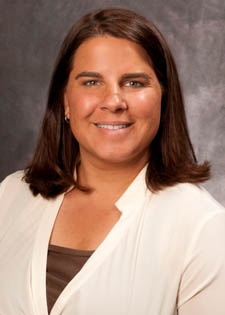 Bobbi Pineda, Ph.D., is an assistant professor of occupational therapy and pediatrics at Washington University in St. Louis. As an early-career investigator in patient and family engagement, Bobbi investigates factors associated with outcomes of high risk newborn infants: specifically, infants born prematurely.
Bobbi Pineda, Ph.D., is an assistant professor of occupational therapy and pediatrics at Washington University in St. Louis. As an early-career investigator in patient and family engagement, Bobbi investigates factors associated with outcomes of high risk newborn infants: specifically, infants born prematurely.
Infants born prematurely and placed in a neonatal intensive care unit (NICU) not only experience separation from their parents, but they are also exposed to repetitive, painful stimuli. Additionally, these infants often do not receive positive, timed sensory exposures typical of what they would have received if not born early. Because of these factors, parents are often left not knowing when and how to engage with their infant in the NICU.
In this installment of Beyond the Lab, Bobbi discusses her work in defining the type and timing of ideal sensory exposures for preterm infants hospitalized in the NICU, and assessing the impact of a NICU stay on infants and their families.
What inspired you to become a scientist/researcher?
I have always had a passion for learning and truly yearned for wanting to know more and more at each stage of my academic career. Within one year of getting my bachelor’s degree, I went back for my master’s degree, because I felt I did not know enough. After my master’s, it took me a little longer, but I continued to have an interest in obtaining more knowledge, which then led me down the pathway to get my Ph.D.
After my Ph.D., I was not certain I wanted to do research full-time, but I soon realized it was perfectly suited to me, as it allows for continuous exploration, discovery, and learning that was part of who I am. Further solidifying my interest in doing clinical research in the neonatal intensive care unit (NICU) was the birth of my first child, who was born preterm and hospitalized for five weeks. It quickly became apparent that there was not enough knowledge about development and therapeutic interventions for infants who begin their lives in the NICU. He became my inspiration to answer more research questions to inform practice and improve the lives of those born early.
What topics/areas/problems in science are you most interested in solving?
I do clinical research on preterm infants in the NICU. Preterm birth puts infants at risk of developmental challenges, and the early NICU environment and experiences within this environment are critical.
At the same time, many parents do not know how to ‘parent’ their infants in the tenuous environment of the NICU. Some withdraw, some feel helpless and some lack confidence in what to do with their infants, all of which can lead to lack of engagement. In turn, the infant is suffering from significant medical complications and often has to have painful medical procedures, so much of the touch and interaction he/she is exposed to is noxious or painful. The infant truly needs his/her parents to engage in care and to help him/her through these medical challenges.
My research focuses on how early experiences shape the brain and lay the foundation for later developmental progression. I also seek to better understand strategies we can use to promote parent engagement in the NICU to foster better parent-child attachment and provide positive, age-appropriate sensory exposures to their infants.
How do your colleagues, mentors, students/postdocs help you achieve your goals?
I have an active lab of motivated and productive graduate occupational therapy students. They have a passion for improving the lives of preterm infants and their families. They work on their own individual projects within the lab, as well as contribute to the ongoing work of providing appropriate sensory-based interventions to preterm infants, while gaining valuable experiences in this advanced practice area.
I also work with a dynamic team of neonatologists and nurses who provide valuable insights on how to merge the developmental needs of each infant with the medical interventions that occur in tandem. My colleagues in social work and biostatistics round out the picture further. The teamwork that occurs by having a multidisciplinary group with members who each contribute their own expertise enables a thriving research atmosphere in which we all learn from each other.
What gets you going every day (besides coffee) and how do you stay motivated?Babies!! They have such amazing capacity. People often ask what I do: if babies don’t do anything, how can they receive therapy or interventions? But infants have a large repertoire of behaviors and movements that are evident to the trained eye, and in these early skills lie the foundations for later function.
It is amazing to watch infants develop over time, and they never cease to amaze me with what they are capable of doing. Parents, too, are amazed with what their infant can do when they are shown. There is also something amazing about infants, who are yet to achieve their full capacity — watching them grow and develop is magical, and it is an honor to be able to impact how they see the world.
What are your greatest limitations/challenges as a scientist/researcher?
My biggest challenge is just not having enough time in a day to achieve all the things I want to achieve. Balancing my own family, health and personal initiatives with a demanding work schedule can be challenging. But limitations and challenges are meant to be overcome with perseverance, and while there may be a daily struggle, there is peace in knowing you strive to make a difference in the lives of children and families.
Learn more about Bobbi’s research here, and follow Washington University’s program in occupational therapy here.

Message sent
Thank you for sharing.